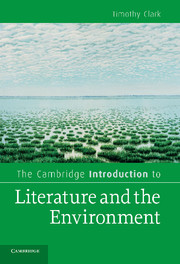Book contents
- Frontmatter
- Contents
- List of illustrations
- Preface
- Acknowledgements
- Introduction
- Romantic and anti-romantic
- The boundaries of the political
- Chapter 7 Thinking like a mountain?
- Chapter 8 Environmental justice and the move ‘beyond nature writing’
- Chapter 9 Two readings
- Chapter 10 Liberalism and green moralism
- Chapter 11 Ecofeminism
- Chapter 12 ‘Post-colonial’ ecojustice
- Chapter 13 Questions of scale
- Science and the struggle for intellectual authority
- The animal mirror
- Notes
- Further reading
- Index
- Cambridge Introductions to …
Chapter 7 - Thinking like a mountain?
Published online by Cambridge University Press: 05 June 2012
- Frontmatter
- Contents
- List of illustrations
- Preface
- Acknowledgements
- Introduction
- Romantic and anti-romantic
- The boundaries of the political
- Chapter 7 Thinking like a mountain?
- Chapter 8 Environmental justice and the move ‘beyond nature writing’
- Chapter 9 Two readings
- Chapter 10 Liberalism and green moralism
- Chapter 11 Ecofeminism
- Chapter 12 ‘Post-colonial’ ecojustice
- Chapter 13 Questions of scale
- Science and the struggle for intellectual authority
- The animal mirror
- Notes
- Further reading
- Index
- Cambridge Introductions to …
Summary
Anyone familiar with radical environmentalist thinking who begins work in a local campaign is soon confronted by a quandary. The only way in which you will realistically prevent an airport from being expanded or a road or nuclear power station from being built is to appeal to the policies, values and criteria of those with the power to make the decision. To campaign about more fundamental issues such as the evils of ‘anthropocentrism’, ‘the arrogance of humanism’ or the stupidity of an endless pursuit of economic growth would be merely to alienate many allies. In order to be heard at all, campaigners must speak in terms accepted within existing structures of governance and economics, the very things they may consider ultimately responsible for environmental degradation in the first place. This is a recognised syndrome in environmental politics: radical environmentalism in theory often turns into merely reform environmentalism in practice.
This quandary can be traced in two of the most influential examples of modern environmental writing, Aldo Leopold's A Sand County Almanac (1949) and Rachel Carson's Silent Spring (1962). Leopold's book has been described as ‘the first self-conscious, sustained, and systematic attempt in modern Western literature to develop an ethical theory which would include the whole of terrestrial nature and terrestrial nature as a whole within the purview of morals’ (J. Baird Callicott). Carson's detailed polemic about the evils of mass pesticide and herbicide use was the landmark book from which the modern environmental movement is often dated.
- Type
- Chapter
- Information
- Publisher: Cambridge University PressPrint publication year: 2011



